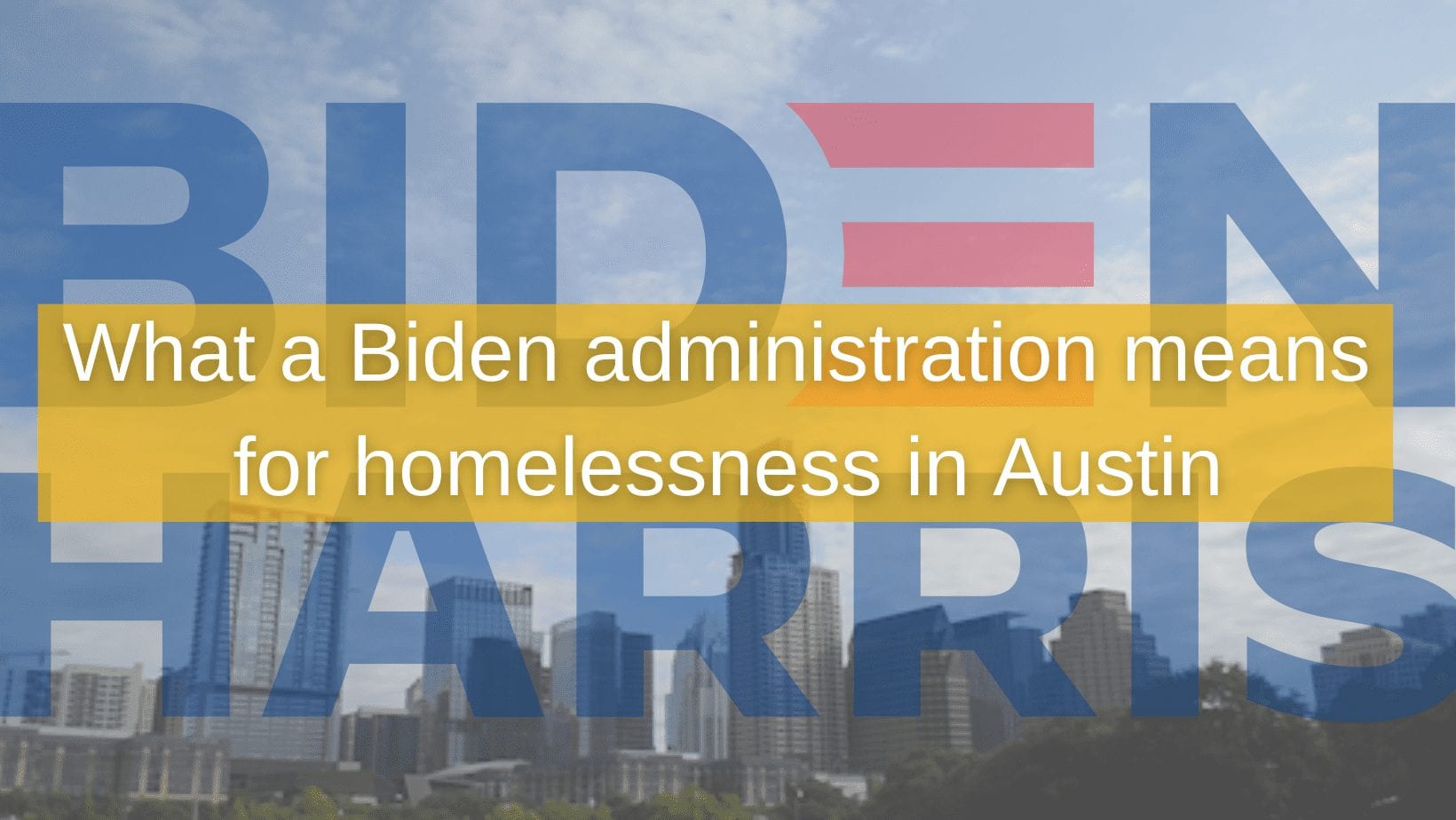What a Biden administration means for homelessness in Austin
AUSTIN, Texas (Jan. 20, 2021) — As the Biden administration formally begins its stewardship of the country, ECHO is encouraged by the incoming President’s clear and comprehensive plan to prevent and end homelessness.
Developed over the course of the campaign, the plan focuses on increasing access to safe, affordable housing and to developing a nationwide strategy to end homelessness and provide a right to housing. “Biden believes everyone should have the right to a safe roof over their head,” the plan reads, a belief shared deeply by Austin’s homeless service providers.
“We’re grateful that this administration is committing to scaling up and investing in proven strategies to end homelessness in Austin and across the country,” said ECHO Executive Director Matt Mollica. “This plan is a clear indication of the Biden administration’s desire to end homelessness in America, a goal we believe is possible using these evidence-based, lasting solutions. We’re excited to get to work with our federal and local partners to get these resources to our most vulnerable citizens as quickly as possible and to advocate for continued support moving forward.”
The administration is looking at homelessness and housing through a racial equity lens, aiming to reduce and eliminate sources of systemic racism that lead our Black/African American neighbors into housing insecurity and homelessness at rates far greater than their white neighbors. A Black Austinite, for instance, is 4.8 times more likely to experience homelessness than a white Austinite.
- Get Involved: Help us reduce homelessness in Austin and advance antiracist policies and practices. Learn + Act: howtohouseatx.org
So what will a Biden administration mean for people experiencing homelessness in Austin? Here are a few key policies to watch for.
- A focus on Housing First
The Biden plan outlines a number of specific policy goals, but perhaps the most important is the commitment to “reform federal housing programs“ using a Housing First model. This strategy, a national best practice, ensures housing programs don’t set requirements or barriers for people to access housing. Fundamental in this strategy is the belief that every person deserves a safe, dignified place to live, regardless of their circumstances. Once a person is housed, supportive services and case management are available so he/she/they can choose whether and how to address other challenges in their lives. The Trump administration signaled a shift away from this model last year, drawing a line between people who are worthy of housing and those who are not. Mounting evidence (PDF) shows Housing First programs are better at housing people quickly and keeping them stably housed longer than other programs. All of Austin’s federally-funded permanent housing programs follow the Housing First model, and a national focus on this strategy means more people experiencing homelessness will have access to housing programs. - Ending the jail-to-homelessness inflow
Another key goal in the plan is to eliminate the jail-to-homelessness inflow. Too often, people are released from incarceration with no housing plan and end up living unsheltered in communities like Austin. Biden will work to ensure 100% of individuals released from state and federal custody have housing lined up. Travis County is already taking steps to connect more people to housing before being released. Last month, ECHO entered an agreement to give access to the area-wide homelessness database, the Homeless Management Information System (HMIS), to Travis County Sheriff’s Office employees, allowing them to see current housing needs and program participation for people experiencing homelessness. - Strengthening protections for the LGBTQ+ community
After the Trump administration moved to cut protections for transgender individuals seeking emergency shelter, the Biden administration is pledging to restore those protections and strengthen others for people experiencing homelessness who identify as LGBTQ+, during his administration and into the future. That will mean increased protections for hundreds of people in Austin. About 1 in 4 (23%) of youth experiencing homelessness (18-24 years old) in Austin identify as LGBTQ+ (PDF). Additionally, 0.9% of people experiencing homelessness and seeking housing as of November 2020 identify as transgender or nonbinary/genderqueer. Increased protections will mean increased safety and access to programs for these groups. - Increased funding for housing and homeless response
Biden’s plan calls for the passage of Rep. Maxine Waters’ Ending Homelessness Act. It will include an unprecedented investment of $13 billion over five years into homeless response systems across the country, resulting in 400,000 additional units of permanent housing for people experiencing homelessness. There’s a deep need for permanent housing units in Austin; recent system modeling by ECHO, the City of Austin, and consultants estimated our community needs nearly 5,000 new units of Permanent Supportive Housing (PSH) and Rapid Re-Housing (RRH) just to meet the current need. Our community’s hotel/motel strategy is a great start, but we need the kind of investment only the federal government can provide if we’re going to ramp up housing resources as much as we need to. Additionally, the Biden team wants to invest an additional $20 billion into the Housing Trust Fund to support building new affordable housing. This will provide more options for people exiting homelessness and will keep more families in permanent homes in an increasingly-expensive city. - Increase access to Section 8 vouchers
Another key component to increasing access to affordable housing in the Biden plan is to provide Section 8 housing vouchers to “every eligible family so that no one has to pay more than 30% of their income for rental housing.” Full funding for this federal housing support program, which saw declines in the 1980s and ’90s (PDF) as housing providers began opting out of the program, will enable more families to remain in permanent housing. The Biden team anticipates it will support 17 million low-income families across the country. - Grow resources for survivors of domestic and sexual violence
The plan lays out three specific goals for survivors of domestic and sexual violence: start a new housing initiative, grow access to housing supports, and protect survivors from housing discrimination. About 70% of people experiencing homelessness in Austin report past trauma or abuse caused their homelessness, and the SAFE Alliance in Austin reported a 25% increase in calls to its 24/7 SAFEline during the first few months of pandemic “fueled by the fear and stresses of COVID-19.” There is a great need for new dedicated resources to survivors of domestic and sexual violence, and the Biden plan aims to provide those resources.
As encouraging as these priorities are, it’s important to note COVID-19 will likely complicate how the Biden administration carries out these strategies. Our country faces the prospect of a tidal wave of homelessness if the federal government fails to provide robust rental assistance across the country. The economic fallout from the ongoing pandemic will be long-lasting for millions of families, and the new administration will need to address this new financial insecurity to prevent households from falling into homelessness at the same time it’s working to end existing homelessness.

